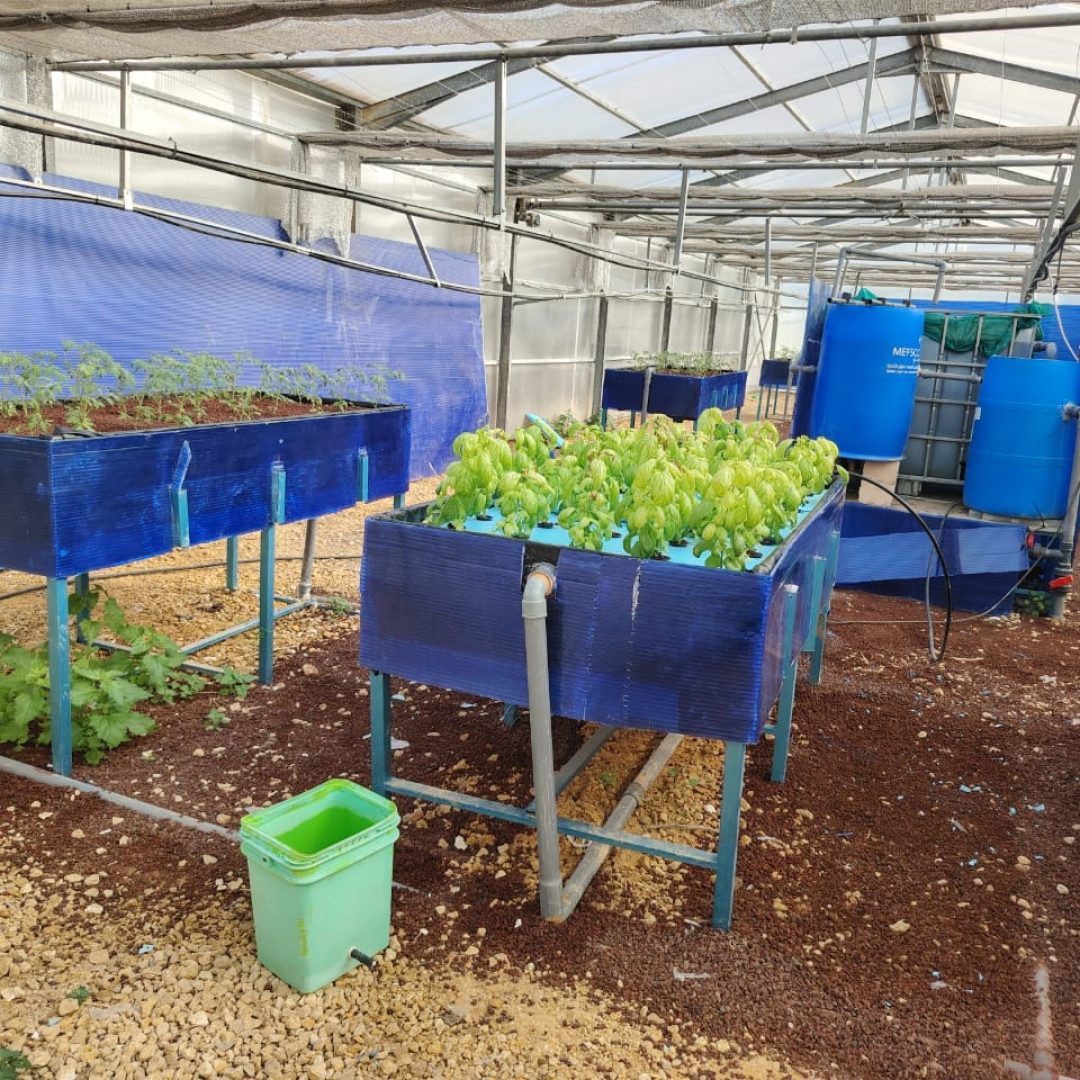The Deir-Alla Aquaponics Demonstrator serves as training and prototype system at NARC, Jordan in the Deir Alla region of Jordan. It is linked to the electricity grid but is suitable for agro-photovoltaic. The Deir-Alla region faces significant agricultural challenges, including severe water and arable land scarcity, making traditional farming methods less viable. The Demonstrator is a climate-smart farming technology allowing to grow fish and plants more efficiently by optimizing water and nutrient use in a controlled environment.
The Deir-Alla Aquaponics Demonstrator addresses the region’s agricultural challenges, particularly water scarcity and limited arable land. Traditional farming methods struggle with these environmental constraints, making it difficult to sustain crop production. The Demonstrator explores aquaponics as a more efficient and sustainable frontier agricultural innovation to optimize water and nutrient usage. This frontier agricultural innovation also contributes to food and nutrition security and promotes sustainable farming practices.

1. Improve Water Efficiency: To significantly reduce water consumption in agriculture by using hydroponic systems, addressing the region's severe water scarcity.
2. Increase Crop Yield: To enhance crop productivity by utilizing controlled growing environments, ensuring stable and higher yields compared to traditional farming methods.
3. Promote Sustainable Agriculture: To introduce and develop sustainable farming practices that minimize environmental impact and are adaptable to regions with limited natural resources.
4. Capacity Building for Local Farmers: To equip local farmers with the knowledge and skills necessary to manage and operate hydroponic systems, fostering long-term self-sufficiency and local ownership of the technology.
5. Food Security Enhancement: To contribute to the region’s food security by providing a reliable and sustainable method of crop production in water-constrained environments.
1. Hydroponic System Installation: State-of-the-art hydroponic systems were installed in greenhouses, allowing for the controlled cultivation of various crops using nutrient-rich water solutions instead of soil.
2. Farmer Training Programs: Local farmers were provided with extensive training on hydroponic farming techniques, including system setup, nutrient management, and maintenance, to ensure effective system operation and management.
3. Crop Trials and Monitoring: Several crops were grown under different conditions to test the system’s efficiency and adaptability. Data on water use, nutrient levels, crop growth, and yields were collected and analyzed to assess the performance of the hydroponic systems.
4. Community Outreach and Demonstrations: Workshops, demonstrations, and information sessions were conducted to raise awareness about the benefits of hydroponic farming and encourage local farmers to adopt these sustainable practices.
5. Research and Development: Ongoing research was conducted to refine hydroponic techniques, optimize water and nutrient use, and improve crop yields, contributing to the long-term success and scalability of the project.

The primary achievement of the Deir-Alla Hydroponic Demonstrator at NARC, Jordan, has been the successful demonstration of aquaponics as a viable solution for agriculture in water-scarce regions. The prototype shows profoundly higher water use efficiency while simultaneously increasing crop yields. Additionally, NARC has empowered local farmers through training and capacity building. This has been done individually and conjointly with other FrontAg Nexus partners. This success positions the Demonstrator as a scalable model for sustainable agriculture in other resource-constrained regions.

Lessons Learned:
1. Water Efficiency: Significant water savings compared to traditional farming.
2. Higher Yields: Increased crop production in controlled environments.
3. Training Required: Farmers need specialized training for system management.
4. High Setup Costs: Initial investment costs may be a challenge for broader adoption.
Replicability:
The model is replicable in regions with water scarcity, requiring proper training and financial support for setup and management.
Scalability Potential:
Aquaponics systems can be scaled for both small and large farming operations, the TRL can be adjusted too, making them adaptable for diverse agricultural settings, from rural to urban environments.









